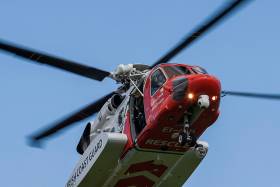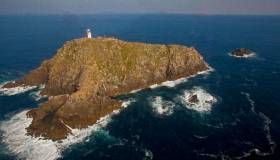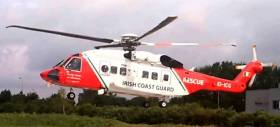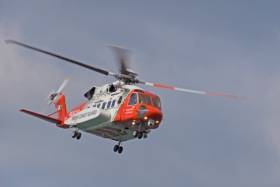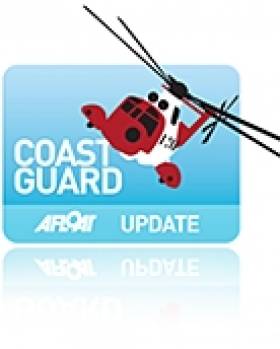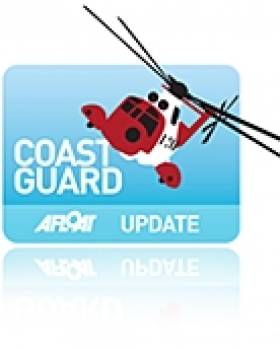Displaying items by tag: CHC Ireland
Court Directs CHC Ireland to Cover Most of Bristow Legal Costs in SAR Contract Suspension Challenge
Helicopter operator CHC Ireland has been ordered to cover most of Bristow Ireland’s legal costs after it sought a suspension of the Government contract awarded to the latter company.
As The Irish Independent reports, last May the Department of Transport announced that Bristow’s Irish subsidiary was the preferred bidder for the new €800 million Irish Coast Guard search and rescue (SAR) tender.
The contract was signed in August, providing for Bristow to introduce a fleet of six SAR-configured Leonardo AW189 helicopters at four Irish Coast Guard bases from 2025.
Bristow will also provide two specialised King Air fixed-wing aircraft.
The 10-year contract has options to extend an additional three years, and also makes provision for the Air Corps to provide the fixed-wing element of the service after five years.
After CHC, the current contract holder, filed a legal challenge, the procedure was suspended.
The contract procedure was lifted in July after a High Court application by Minister for Transport Eamon Ryan in July, and this ruling was upheld by the Court of Appeal.
The Court of Appeal ruling stated public interest reasons, including considerable difficulties which could be experienced by Bristow in securing slots to manufacture AW189s at short notice if there was a suspension.
Part of CHC’s challenge is a claim that the Sikorsky S-92A helicopters used by it in Ireland are larger, have more cabin space and have a longer range than the Leonardo aircraft.
The Sikorsky helicopter can carry 19 passengers and has an 848km range, while the Leonardo can carry 16 and has an 802km range.
In a High Court ruling on October 24th, Mr Justice Michael Twomey awarded Bristow most of its costs against CHC in objecting to the suspension of the contract award. CHC’s own legal case continues.
US group Bristow recently told investors that it will spend about $142m (€135m) on five new helicopters for the Irish contract.
Read The Irish Independent here
CHC Ireland Continues to Pursue Legal Challenge Over Irish Coast Guard Aviation Contract
CHC Ireland is continuing to pursue its High Court challenge to the validity of the tender procedure for the Irish Coast Guard’s Irish Coast Guard’s new helicopter search and rescue contract.
The new contract with Bristow Ireland had been automatically suspended after CHC Ireland, the existing holder, announced its High Court challenge on June 14th.
CHC Ireland, which runs four helicopter bases for the Irish Coast Guard at Dublin, Shannon, Sligo and Waterford, had said it was “concerned that there are a number of flaws in the conduct of the competition”.
It initiated the legal action after Minister for Transport Eamon Ryan had confirmed that Bristow Ireland, a subsidiary of the US-based Bristow Group Inc, was the preferred bidder for the service to run for ten years from 2025.
The automatic suspension of any further contract procedures kicked in, but was then lifted in July, after the minister applied to the court for same.
This decision was upheld by the Irish court of appeal, allowing Mr Ryan to confirm he was signing the new contract with Bristow Ireland on August 22nd.
His department said that under the new contract, Bristow Ireland Limited would operate six AW189 helicopters from four dedicated bases in Sligo, Shannon, Waterford and Dublin Weston Airport.
It will also have two King Air fixed-wing aircraft at Shannon, for five years, allowing for the possibility that the Air Corps, Ireland’s air defence wing, may then assume responsibility for the fixed wing element.
“The new Irish Coast Guard aviation service will be introduced by Bristow Ireland Limited gradually on a phased basis and will be fully operational by July 2025,”the department said.
CHC Ireland said it was continuing its legal action, but would make no further comment. It is understood a court hearing on the issue may be heard in October.
CHC Ireland Initiates High Court Challenge Over SAR Contract
CHC Ireland has confirmed that it has initiated a High Court challenge to the validity of the tender procedure for the Irish Coast Guard’s new search and rescue contract.
Earlier this month, Minister for Transport Eamon Ryan confirmed that Bristow Ireland Ltd is the preferred bidder for the next ten-year search and rescue (SAR) contract, costing 670 million euro ex VAT.
Over 140 people have been employed by CHC Ireland at the four bases over the past 20 years of the current contract, which cost 60 million euro annually.
Bristow Ireland Ltd is a subsidiary of the Bristow group which runs search and rescue services for Britain, the Netherlands and the Falkland Islands.
CHC director of operations and accountable manager Ireland Rob Tatten said that “upon considering the outcome of the tender process as notified to CHC, CHC is concerned that there are a number of flaws in the conduct of the competition”.
“In view of the strict time limits in Irish law for taking steps to protect our rights we were left with no option but to initiate proceedings to challenge the outcome of the process,” Tatten said in a statement.
“CHC Ireland has submitted a tender which it believes is innovative and represents the best value to the taxpayer and the best outcome for the Irish Coast Guard helicopter search and rescue service,” he said.
“Foremost in our thoughts are the staff who provide the service and the people who rely on it. This is consistent with our philosophy of putting people at the forefront of everything, as we have done for the past 20-plus years,” Tatten said.
Provision of a fixed wing aircraft is also included in the new Irish contract from 2025, which provides for the Air Corps to take over this element of the service after five years.
There have been fears about job losses among CHC staff once the contract is transferred. Each of the four Irish Coast Guard bases contracted to CHC Ireland is staffed by about 35 people, including up to nine pilots, winch crew and engineers, along with staff responsible for rosters, flight operations and engineering supervision.
Senator Gerard Craughwell, who has welcomed the awarding of the contract to Bristow, has called on Bristow to make a statement that it will “start considering a transfer of employment”.
Existing staff with CHC Ireland are “brave, solid heroes who put their lives on the line daily to save lives”, he said, and they deserved assurances.
The Irish Coast Guard responded to 2,699 incidents last year – the second highest number in five years -with SAR helicopters flying 829 missions.
The Oireachtas Public Accounts Committee has heard that the Irish Coast Guard’s rescue helicopter service costs the state around €60 million annually.
An initial 10-year contract with CHC Ireland to provide services with Sikorsky S-92 helicopters from four bases began in 2012 and was initially valued at €500 million.
As reported in The Irish Times yesterday, Thursday 28 May, Department of Transport secretary general Ken Spratt told the PAC that this cost will have risen to €650 million by 2022 but that it is “not a fixed-cost contract” and is “broadly in line with expectations at the outset”.
He also confirmed that one of three contract extensions has been exercised and CHC Ireland will continue to provide the coastguard SAR service until at least July 2023.
The Irish Times has more on the story HERE.
Coastguard Helicopter Operators Warned Over Lifejacket Beacon Issues Years Before Rescue 116 Tragedy
#Rescue116 - Lifejackets worn by the crew of the downed Rescue 116 were not fit for purpose — and the operators of Ireland’s coastguard rescue helicopter service knew five years beforehand.
That’s according to a report set to be broadcast on RTÉ One’s Prime Time at 9.35pm tonight (Thursday 26 October), which reveals that pilots had warned management at CHC Ireland that locator beacons on supplied lifejackets were fitted too close to the GPS antenna, contrary to manufacturer’s guidelines.
“Effectively this means that the beacon could produce absolutely zero receivable transmissions,” said a 2014 safety report filed by one crew member, while another warned that “pilots are wholly exposed in the event of a ditching”.
The Air Accident Investigation Unit’s preliminary report in April recommended a review of the use of locator beacons on Mk 44 lifejackets used by the crew of Rescue 116.
The crash on 14 March caused the deaths of Capt Dara Fitzpatrick and Capt Mark Duffy. The bodies of Paul Ormsby and winchman Ciaran Smith remain lost at sea.
While the installation issue only applies to the pilots’ lifejackets, which have since been withdrawn from service, the Prime Time report will also cover documents that identify similar issues with those worn by winch crew across the Irish Coast Guard fleet.
The new revelations come after a previous Prime Time report this summer said the issue of missing data from the helicopter’s onboard warning system was flagged four years ago with senior management at CHC Ireland, which won a 10-year contract to operate the Irish Coast Guard’s helicopter SAR services in 2012.
#Rescue116 - A new report reveals that the absence of data on Black Rock from Rescue 116’s onboard warning system was flagged with the Irish Coast Guard’s helicopter operators years before the fatal crash earlier this year.
Captains Dara Fitzpatrick and Mark Duffy, along with winch operator Ciarán Smith and Paul Ormsby, died after their Sikorsky S-92 went down at the small Co Mayo island, west of Blacksod on the Mullet Peninsula, in the early hours of 14 March 2017.
Four months on and despite exhaustive searches of the area, the remains of Smith and Ormsby have not been found.
April's interim report into the tragedy suggested that the helicopter had been flying using a pre-programmed route that was missing specific data relating to Black Rock, while en route to a planned refuelling stop at Blacksod.
Now a report from RTÉ’s Prime Time says the issue of the missing data was raised four years ago with a senior manager at CHC Ireland, which won the 10-year, €500 million contract to operate Ireland’s helicopter SAR services in 2012.
The Irish fleet of long-range SAR helicopters was equipped with an Enhanced Ground Proximity Warning System, or EGPWS, in 2013.
That year, Sligo-based Irish Coast Guard pilots noted that Black Rock was missing from the EGPWS during routine test flights in the area.
However, Prime Time learned from a source that weeks after the incident, coastguard staff were told management were looking into whether that information had been passed on to those responsible for updating the system’s obstacle database.
That same database was found just days after the Black Rock accident to have incorrect information for Skellig Michael, listing it as just 56m rather than its actual 217m height, though this has since been corrected.
RTÉ News has more on the story HERE.
Coastguard Helicopter Contractor Files For Bankruptcy Protection, Irish Subsidiary Not Affected
#Coastguard - The Canadian helicopter services giant contracted to provide the Irish Coast Guard's search and rescue service has filed for bankruptcy protection in Texas.
According to Independent.ie, CHC Group has blamed the worldwide drop in oil prices as the cause of "decreased customer demand" in its filing for Chapter 11 protection.
However, the Irish subsidiary contracted to provide Ireland's coastguard helicopter service till at least 2022 will not be affected by the move.
Only weeks ago CHC Ireland announced an eight-fold increase in profits in 2015 over the previous year.
Coastguard Helicopter Contractor's Profits Up Eightfold On 2014
#Coastguard - Profits at the contractor providing Ireland's coastguard helicopter service are nearly eight times greater than in 2014, as the Irish Independent reports.
CHC Ireland, a subsidiary of the Canadian helicopter services giant, says its turnover jumped by 24% to €52 million in the tax year ending April 2015, for a profit of €3.4 million.
The firm's latest accounts filed at the Companies Office also reveal that the Irish Coast Guard's fleet of four Sikorsky S92 long-range search and rescue helicopters undertook 3,331 missions in the 12 months ending April 2015, 138 more than the previous year -- setting up for what was the service's busiest year since 1991.
Four years ago the coastguard took delivery of its first purpose-built and fitted Sikorsky S-92 from CHC under a 10-year, €500 million contract that runs till 2022.
The Irish Independent has more on the story HERE.
Coastguard Takes Delivery of New Chopper
#COASTGUARD - The Irish Coast Guard has taken delivery of its new search and rescue helicopter at its Shannon base, The Irish Times reports.
As previously reported on Afloat.ie, Sikorsky completed production of the new S-92 helicopter for the Irish Coast Guard last December under the rescue service's €500 million deal with CHC Ireland to revamp the aircraft fleet.
The deal will also see the coastguard's remaining four Sikorsky S-61s replaced by second-hand S-62s from Scotland over the coming months.
Training with crews at Shannon is set to begin shortly ahead of the S-92's first public demonstration at the centenary of the Titanic’s departure from Cobh in Cork Harbour.
Meanwhile, it is expected that the Air Corps may be offered an upgraded air ambulance role, after they were ruled out as contenders for search and rescue work amid some controversy.
The Department of Health has reportedly been in exploratory talks with private firms regarding the provision of an inter-hospital emergency air transfer service, as called for by the Roscommon Hospital Action Group.
The Irish Times has more on the story HERE.
New Helicopter for Irish Coast Guard is Completed
#COASTGUARD - Sikorsky has completed production of a new S-92 helicopter for the Irish Coast Guard under the rescue service's €500 million deal with CHC Ireland.
The US-based helicopter firm and CHC formalised the purchase on Wednesday (21 December) with Irish Coast Guard director Chris Reynolds during a hand-over ceremony at the S-92 commercial helicopter assembly facility in Coatesville, Pennsylvania.
Equipped for dedicated search and rescue (SAR) operations, the helicopter will provide coverage for deep Atlantic Ocean missions, service Ireland's offshore islands and provide rescue cover on the west coast from Cork to Galway.
The new aircraft will be based at Shannon and will replace the current coastguard SAR helicopter, a Sikorsky S-61, which has given 20 years of unbroken service.
According to Sikorsky, the S-92 is equipped with advanced systems and hardware, including an automated flight control system that enables the pilot to fly pre-programmed search patterns and perform delicate hover manoeuvres; a wireless intercom allowing a rescue swimmer to communicate with the crew; radio transceivers to communicate with ships and rescue services; a weather radar and infrared sensor; and a digital video system to record rescues.
Reynolds said the new helicopter - which joins four second-hand machines on a 10-year lease - represents a stepped improvement in Ireland's ability to care for and service its seagoing, coastal and island communities.
"I am very happy that the Coast Guard will operate what I consider to be the leading SAR helicopter in the world," he added.
As reported earlier this year on Afloat.ie, the new chopper is part of a deal that raised questions from a Fine Gael TD over allegations that a competing tender did not have a "good reputation".
Fergus O'Dowd questioning the contract with CHC Ireland after receiving documents in which Chris Reynolds said the Air Corps – whose helicopters are supplied by AgustaWestland - were uneqipped for the role and that no cost saving would be made if they took on the service.



























